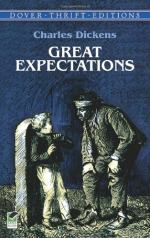I confess that I expected to see my sister denounce him, and that I was disappointed by the different result. She manifested the greatest anxiety to be on good terms with him, was evidently much pleased by his being at length produced, and motioned that she would have him given something to drink. She watched his countenance as if she were particularly wishful to be assured that he took kindly to his reception, she showed every possible desire to conciliate him, and there was an air of humble propitiation in all she did, such as I have seen pervade the bearing of a child towards a hard master. After that day, a day rarely passed without her drawing the hammer on her slate, and without Orlick’s slouching in and standing doggedly before her, as if he knew no more than I did what to make of it.
Chapter 17
I now fell into a regular routine of apprenticeship life, which was varied, beyond the limits of the village and the marshes, by no more remarkable circumstance than the arrival of my birthday and my paying another visit to Miss Havisham. I found Miss Sarah Pocket still on duty at the gate, I found Miss Havisham just as I had left her, and she spoke of Estella in the very same way, if not in the very same words. The interview lasted but a few minutes, and she gave me a guinea when I was going, and told me to come again on my next birthday. I may mention at once that this became an annual custom. I tried to decline taking the guinea on the first occasion, but with no better effect than causing her to ask me very angrily, if I expected more? Then, and after that, I took it.
So unchanging was the dull old house, the yellow light in the darkened room, the faded spectre in the chair by the dressing-table glass, that I felt as if the stopping of the clocks had stopped Time in that mysterious place, and, while I and everything else outside it grew older, it stood still. Daylight never entered the house as to my thoughts and remembrances of it, any more than as to the actual fact. It bewildered me, and under its influence I continued at heart to hate my trade and to be ashamed of home.
Imperceptibly I became conscious of a change in Biddy, however. Her shoes came up at the heel, her hair grew bright and neat, her hands were always clean. She was not beautiful — she was common, and could not be like Estella — but she was pleasant and wholesome and sweet-tempered. She had not been with us more than a year (I remember her being newly out of mourning at the time it struck me), when I observed to myself one evening that she had curiously thoughtful and attentive eyes; eyes that were very pretty and very good.
It came of my lifting up my own eyes from a task I was poring at — writing some passages from a book, to improve myself in two ways at once by a sort of stratagem — and seeing Biddy observant of what I was about. I laid down my pen, and Biddy stopped in her needlework without laying it down.




